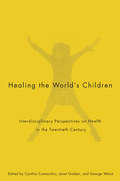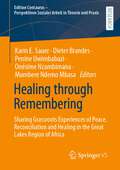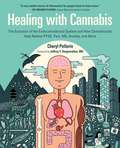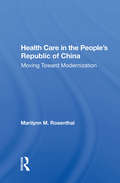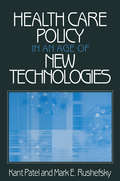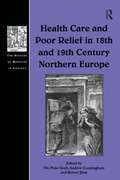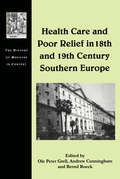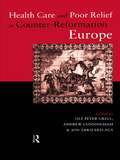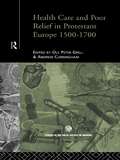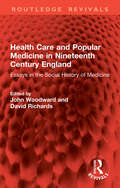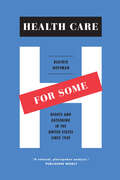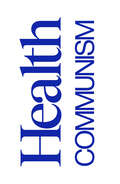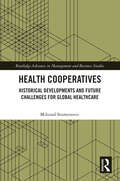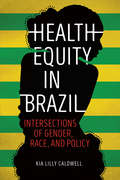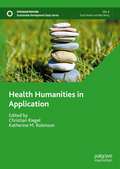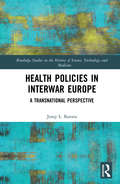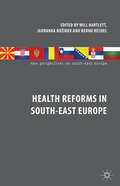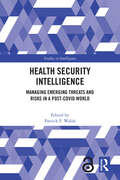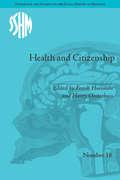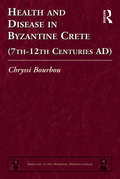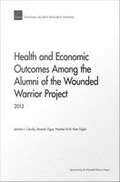- Table View
- List View
Healing the Widower's Heart
by Susan Anne MasonA Child's Only Hope When widower Nathan Porter brings his grieving son, Zach, to Wyndermere House's camp, he is desperate for a lifeline. Nathan's hoping the change of scenery to the woods of upstate New York will help mend his son's heart. But the counselor assigned to his son's care seems too young-and too pretty-to be qualified. Paige McFarlane's learned what loving someone-and losing them-costs. But soon her efforts with Zach reveal that to help the son she must also help the dad. As Nathan and Paige work together to mend the boy's broken spirit, they realize the walls around their own hearts could be crumbling, as well.
Healing the World's Children: Interdisciplinary Perspectives on Child Health in the Twentieth Century (McGill-Queen's/Associated Medical Services Studies in the History of Medicine, Health, and Society #77)
by George Weisz Cynthia Comacchio Janet GoldenEssays range from historical overviews and historiographic surveys of children's health in various regions of the world, to disability and affliction narratives - from polio in North American to AIDS orphans in post-Apartheid South Africa - to interpretations of artistic renderings of sick children that tell us much about medicine, family, and society at specific times in history.
Healing through Remembering: Sharing Grassroots Experiences of Peace, Reconciliation and Healing in the Great Lakes Region of Africa (Edition Centaurus - Perspektiven Sozialer Arbeit in Theorie und Praxis)
by Karin E. Sauer Penine Uwimbabazi Dieter Brandes Onésime Nzambimana Mumbere Ndemo MbasaThis educational handbook displays grassroots experiences of peace, reconciliation, and healing in the Great Lakes region of Africa, in which Burundian, Congolese, and Rwandan authors share their understandings and practices of Memory Work. They committed to do so in a joint Participatory Action Research Team together with German facilitators. The team members ‘opened their archives’ on the traumatizing effects of the severe conflicts that each of these countries experienced. Their learnings and findings from this research process are collected in this book, which aims to resolve remaining tensions resulting from past experiences. Displaying a variety of strategies that lead to a Healing of Memories, it is high time to integrate such discourses into a mainly Western-European-centered scientific community. In this way, the book aims to fill the academic void regarding the German-colonial legacy of violence in the three neighboring countries, which was fueled under colonial rule. As such, this book is central to current discourses on the decolonization of science in terms of authorship, research ethics, and methods.
Healing with Cannabis: The Evolution of the Endocannabinoid System and How Cannabinoids Help Relieve PTSD, Pain, MS, Anxiety, and More
by Cheryl PellerinAn Informative Read for an Audience Interested in Why and How Medical Cannabis Helps Treat a Range of Illnesses—Maybe All of Them With cannabis approved in fourteen states (including the District and two US territories), medical cannabis approved in at least 35 states, and hemp (very-low-THC cannabis) off the controlled substances list, millions now treat their ills with medical cannabis or non-intoxicating cannabinoids like CBD. But lots of them don&’t know why or how cannabis works in the body. Healing with Cannabis informs readers about an ancient biological system newly discovered in every vertebrate on the planet—the endocannabinoid system. This system is the only reason cannabis works in the body, and it&’s why cannabis is effective in a broad range of disorders. The book offers an informal tone, a little humor, interviews with some of the most knowledgeable cannabinoid scientists, color images, and a selection of research and clinical trials to recount the story of the endocannabinoid system, its origins in the earliest forms of life on Earth, the evolution of its elements, and the discoveries, millions of years later, of more of its elements over time. Healing with Cannabis explains the surprising reasons evolution conserved the endocannabinoid system over a billion years and tells specifically how cannabis has positive effects on some of society&’s most devastating illnesses, including neurodegenerative diseases, post-traumatic stress disorder, pain, movement disorders, cancer and chemotherapy, and addiction. The book also shows how medical cannabis, widely available, will change the face of public health, and how nearly everyone can benefit from this versatile medicine that has a 5,000-year history of safe and effective use.
Health Care In The People's Republic Of China: Moving Toward Modernization
by Marilynn M RosenthalThe Chinese health care system is deeply rooted in a traditional, agricultural way of life, but since the late 1970s it has been increasingly influenced by the dynamics of a modernizing society. Dr. Rosenthal, using data collected through interviews, small-scale surveys, and the Chinese press, examines how Chinese medicine is being transformed. She
Health Care Policy in an Age of New Technologies
by Mark E Rushefsky Kant PatelRevolutionary advances in biomedical research and information systems technology pose new and difficult issues for American health care policy, especially in the context of managed care. Health Care Policy in a New Millennium takes on this challenging array of issues where the dignity of individual life meets the imperatives of national-level health-care systems - patients' rights, rationing of care, organ transplants, genetic research, confidentiality of medical records, the right to die, and other ethical dilemmas. The book places these critical questions about the quality of life in our society in their political, legal, social, economic, and ethical contexts.
Health Care and Poor Relief in 18th and 19th Century Northern Europe (The History of Medicine in Context)
by Ole Peter Grell Andrew CunninghamThroughout history governments have had to confront the problem of how to deal with the poorer parts of their population. During the medieval and early modern period this responsibility was largely borne by religious institutions, civic institutions and individual charity. By the eighteenth century, however, the rapid social and economic changes brought about by industrialisation put these systems under intolerable strain, forcing radical new solutions to be sought to address both old and new problems of health care and poor relief. This volume looks at how northern European governments of the eighteenth and nineteenth centuries coped with the needs of the poor, whilst balancing any new measures against the perceived negative effects of relief upon the moral wellbeing of the poor and issues of social stability. Taken together, the essays in this volume chart the varying responses of states, social classes and political theorists towards the great social and economic issue of the age, industrialisation. Its demands and effects undermined the capacity of the old poor relief arrangements to look after those people that the fits and starts of the industrialisation cycle itself turned into paupers. The result was a response that replaced the traditional principle of 'outdoor' relief, with a generally repressive system of 'indoor' relief that lasted until the rise of organised labour forced a more benign approach to the problems of poverty. Although complete in itself, this volume also forms the third of a four-volume survey of health care and poor relief provision between 1500 and 1900, edited by Ole Peter Grell and Andrew Cunningham.
Health Care and Poor Relief in 18th and 19th Century Southern Europe (The History of Medicine in Context)
by Ole Peter GrellThe poor and the sick-poor have always presented a problem to the governments and churches of Europe. Whose responsibility are they? Are they a wilful burden on the honest working population, or are they a necessary presence for the true Christian to live the true Christian life? In the 18th and 19th centuries what happened to the poor and the sick-poor in the north and south of Europe was different. In the north there occurred first the Reformation in the 16th century, which changed attitudes to the poor, and then the advent of industrialisation, with its far-reaching effects of pauperisation of people both in town and countryside. In the Catholic south, where industrialisation did not appear so soon, the Catholic Church introduced a programme of reform at all levels but along traditional lines. This included the founding of new orders dedicated to the care of the poor and sick, of new institutions within which to house and care for them. At all times it was taken for granted that it was a necessary aspect of being a Christian that one should give for the care of the needy, and that this was not the duty of the state or of secular institutions. The secularising movement did however reach the southern countries by way both of the Enlightenment and - more drastically - in the form of the Napoleonic invasions. But after the defeat of Napoleon, the Church reasserted its right to administer and control the support of the poor and sick, and this situation continued until 1900 in most areas. Moreover the effects of industrialisation and the concomitant increase in population did make itself felt in the south in the course of the 19th century, which put great stress on the institutions for poor relief and health care for the poor. All this is still relevant today, since the situations that governments and the Catholic Church found themselves confronted with, and the stark choices they had to make, are being replayed to some extent today. Who is responsible for the poor, who is to blame for their being poor? How should their poverty be relieved, how should the health care of the many be funded? These are still live issues today. While complete in itself the present volume also forms the fourth and last of a four-volume survey of health care and poor relief in Europe between 1500 and 1900, edited by Ole Peter Grell and Andrew Cunningham
Health Care and Poor Relief in Counter-Reformation Europe
by Ole Peter Grell Andrew Cunningham Jon ArrizabalagaThe role of religion was of paramount importance in the change of attitudes and approaches to health care and charity which took place in the centuries following the Council of Trent. Health Care and Poor Relief in Counter-Reformation Europe, examines the effects of the Counter-Reformation on health care and poor relief in Southern Catholic Europe in the period between 1540 and 1700.As well as a comprehensive introduction discussing issues of the nature of the Catholic or Counter-Reformation and the welfare provisions of the period, Health Care and Poor Relief sets the period in its social, economic, religious and ideological context. The book draws on the practices in different localities in Southern Europe, ranging from the Republic of Venice and the Kingdom of Naples to Germany and Austria. These examples establish how and why a revitalised and strenghtened post-Tridentine Catholic church managed to reshape and reinvigorate welfare provisions in Southern Europe.
Health Care and Poor Relief in Protestant Europe 1500-1700 (Routledge Studies in the Social History of Medicine)
by Ole Peter Grell Andrew CunninghamThe problem of the poor grew in the early modern period as populations rose dramatically and created many extra pressures on the state. In Northern Europe, cities were going through a period of rapid growth and central and local administrations saw considerable expansion. This volume provides an outline of the developments in health care and poor relief in the economically important regions of Northern Europe in this period when urban poverty became a generally recognized problem for both magistracies and governments. With contributions from international scholars in the field, including Jonathan Israel, Paul Slack and Rosalind Mitchison, this volume draws on research into local conditions and maps general patterns of development.
Health Care and Popular Medicine in Nineteenth Century England: Essays in the Social History of Medicine (Routledge Revivals)
by John Woodward David RichardsOriginally published in 1977, this book presents a selection of work by historians and sociologists on medicine and society in the 19th century. It concentrates on practitioners and patients, quackery and folk medicine, as elements in the social, cultural, political and economic structure of the community at large. The relevance of social history in medicine to the analysis of the role of medicine in society is discussed as well as the knowledge of sex and sexuality and the professionalisation of medicine.
Health Care for Some: Rights and Rationing in the United States since 1930
by Beatrix HoffmanIn Health Care for Some, Beatrix Hoffman offers an engaging and in-depth look at America’s long tradition of unequal access to health care. She argues that two main features have characterized the US health system: a refusal to adopt a right to care and a particularly American approach to the rationing of care. Health Care for Some shows that the haphazard way the US system allocates medical services—using income, race, region, insurance coverage, and many other factors—is a disorganized, illogical, and powerful form of rationing. And unlike rationing in most countries, which is intended to keep costs down, rationing in the United States has actually led to increased costs, resulting in the most expensive health care system in the world.While most histories of US health care emphasize failed policy reforms, Health Care for Some looks at the system from the ground up in order to examine how rationing is experienced by ordinary Americans and how experiences of rationing have led to claims for a right to health care. By taking this approach, Hoffman puts a much-needed human face on a topic that is too often dominated by talking heads.
Health Care in America: A History
by John C. BurnhamA comprehensive history of sickness, health, and medicine in America from Colonial times to the present.In Health Care in America, historian John C. Burnham describes changes over four centuries of medicine and public health in America. Beginning with seventeenth-century concerns over personal and neighborhood illnesses, Burnham concludes with the arrival of a new epoch in American medicine and health care at the turn of the twenty-first century.From the 1600s through the 1990s, Americans turned to a variety of healers, practices, and institutions in their efforts to prevent and survive epidemics of smallpox, yellow fever, cholera, influenza, polio, and AIDS. Health care workers in all periods attended births and deaths and cared for people who had injuries, disabilities, and chronic diseases.Drawing on primary sources, classic scholarship, and a vast body of recent literature in the history of medicine and public health, Burnham finds that traditional healing, care, and medicine dominated the United States until the late nineteenth century, when antiseptic/aseptic surgery and germ theory initiated an intellectual, social, and technical transformation. He divides the age of modern medicine into several eras: physiological medicine (1910s–1930s), antibiotics (1930s–1950s), technology (1950s–1960s), environmental medicine (1970s–1980s), and, beginning around 1990, genetic medicine. The cumulating developments in each era led to today's radically altered doctor-patient relationship and the insistent questions that swirl around the financial cost of health care.Burnham's sweeping narrative makes sense of medical practice, medical research, and human frailties and foibles, opening the door to a new understanding of our current concerns.
Health Communism: A Surplus Manifesto
by Beatrice Adler-Bolton Artie VierkantA searing analysis of health and illness under capitalism from hosts of the hit podcast &“Death Panel&” In this fiery, theoretical tour-de-force, Beatrice Adler-Bolton and Artie Vierkant offer an overview of life and death under capitalism and argue for a new global left politics aimed at severing the ties between capital and one of its primary tools: health. Written by co-hosts of the hit &“Death Panel&” podcast and longtime disability justice and healthcare activists Adler-Bolton and Vierkant, Health Communism first examines how capital has instrumentalized health, disability, madness, and illness to create a class seen as &“surplus,&” regarded as a fiscal and social burden. Demarcating the healthy from the surplus, the worker from the &“unfit&” to work, the authors argue, serves not only to undermine solidarity but to mark whole populations for extraction by the industries that have emerged to manage and contain this &“surplus&” population. Health Communism then looks to the grave threat capital poses to global public health, and at the rare movements around the world that have successfully challenged the extractive economy of health. Ultimately, Adler-Bolton and Vierkant argue, we will not succeed in defeating capitalism until we sever health from capital. To do this will require a radical new politics of solidarity that centers the surplus, built on an understanding that we must not base the value of human life on one&’s willingness or ability to be productive within the current political economy. Capital, it turns out, only fears health.
Health Consequences of Service During the Persian Gulf War: Initial Findings and Recommendations for Immediate Action
by Committee to Review the Health Consequences of Service During the Persian Gulf WarThis initial volume in an ongoing study of the potential health consequences of service during the Persian Gulf War responds to a request from Congress to determine whether actions taken to evaluate health effects have been appropriate. It reflects the committee's examination of health outcomes and related research efforts, women's health and reproductive health issues, infrastructure and procedures for data collection, health services influences, the role of psychiatric diagnosis, and a review of the activities of boards and coordinating groups, as well as how issues stemming from involvement in the Persian Gulf might be relevant for possible future conflicts. While the committee continues its full-length study of the problem, the recommendations in this volume are for actions it feels should be taken immediately.
Health Cooperatives: Historical Developments and Future Challenges for Global Healthcare (Routledge Advances in Management and Business Studies)
by Milorad StamenovicIn the era of complex healthcare challenges, the question arises: Can health cooperatives be the catalysts for transformation in the healthcare system? This research monograph delves into this thought-provoking query, exploring the potential of health cooperatives as influential entities in the future of healthcare. Despite advancements, healthcare systems still need help with sustainability, equality, costly therapies and various other segments. This monograph aims to dissect the notion of "Healthy lives and well-being for everyone," protracted by policymakers and proponents of the existing healthcare setup. Researchers, cooperative professionals, healthcare practitioners, decision-makers, patients, policy developers, librarians and booksellers will find this book relevant and interesting to read. The captivating narrative is supported by analysing 20 countries across five continents, explaining their historical and modern notion of the context and health cooperatives' development. It also sheds light on the significance of modern cooperatives in the current healthcare landscape. In addition, the monograph offers insights into multiple case studies of health-oriented cooperatives showing their diversity and flexibility in operations. This research monograph paves the way for envisioning a future where health cooperatives have the potential to play an important role in addressing various challenges affecting positive societal changes.
Health Equity in Brazil: Intersections of Gender, Race, and Policy
by Kia Lilly CaldwellBrazil's leadership role in the fight against HIV has brought its public health system widespread praise. But the nation still faces serious health challenges and inequities. Though home to the world's second largest African-descendant population, Brazil failed to address many of its public health issues that disproportionately impact Afro-Brazilian women and men. Kia Lilly Caldwell draws on twenty years of engagement with activists, issues, and policy initiatives to document how the country's feminist health movement and black women's movement have fought for much-needed changes in women's health. Merging ethnography with a historical analysis of policies and programs, Caldwell offers a close examination of institutional and structural factors that have impacted the quest for gender and racial health equity in Brazil. As she shows, activists have played an essential role in policy development in areas ranging from maternal mortality to female sterilization. Caldwell's insightful portrait of the public health system also details how its weaknesses contribute to ongoing failures and challenges while also imperiling the advances that have been made.
Health Humanities in Application (Sustainable Development Goals Series)
by Katherine M. Robinson Christian RiegelThis book focuses on health humanities in application. The field reflects many intellectual interests and practical applications, serving researchers, educators, students, health care practitioners, and community members wherever health and wellness and the humanities intersect. How we implement health humanities forms the core approach, and perspectives are global, including North America, Africa, Europe, and India. Emphasizing key developments in health humanities, the book’s chapters examine applications, including reproductive health policy and arts‑based research methods, black feminist approaches to health humanities pedagogy, artistic expressions of lived experience of the coronavirus, narratives of repair and re‑articulation and creativity, cultural competency in physician‑patient communication through dance, embodied dance practice as knowing and healing, interdisciplinarity and transdisciplinarity, eye tracking, ableism and disability, rethinking expertise in disability justice, disability and the Global South, coronavirus and Indian politics, visual storytelling in graphic medicine, and medical progress and racism in graphic fiction.
Health Insurance Politics in Japan: Policy Development, Government, and the Japan Medical Association (The Culture and Politics of Health Care Work)
by Takakazu YamagishiJapan is the fastest aging country, with the largest super-aged society in the world and growing larger by the day, yet its universal health care costs are relatively low. In Health Insurance Politics in Japan, Takakazu Yamagishi draws back the curtain for an international audience and investigates how Japan has been able to control health care costs through health insurance politics.Covering the period from the Meiji Restoration to the Abe Administration, Yamagishi uses a historical institutionalist approach to examine the driving force behind the development of health insurance policies in Japan. Yamagishi pays special attention to the roles of government and medical professionals, the main actors of the policymaking and medical worlds, in this development. Health Insurance Politics in Japan pushes Japan into the spotlight of the international conversation about health care reform.
Health Policies in Interwar Europe: A Transnational Perspective (Routledge Studies in the History of Science, Technology and Medicine)
by Josep L. BaronaResearch into public health policies and expert instruction has been oriented traditionally in the national context. There is a rich historiography that analyses the development of health policies and systems in various European and American countries during the first decades of the twentieth century. What is often ignored, however, is the study of the great many connections and circulations of knowledge, people, technologies, artefacts and practices during that period between countries. This book redresses that balance.
Health Reforms in South East Europe
by Will Bartlett Jadranka Božikov Bernd RechelOver the last two decades the countries of South East Europe have engaged in far-reaching reforms of their health systems. However, overviews of reform efforts in this part of Europe have been sorely lacking. This book addresses this shortage through the analysis of key aspects of health reforms and health workforce mobility in South East Europe.
Health Security Intelligence: Managing Emerging Threats and Risks in a Post-Covid World (Studies in Intelligence)
by Patrick F WalshThe book takes a multi-disciplinary approach to explore the role national security intelligence agencies played in supporting national governments’ response to COVID-19.Spanning the ‘Five Eyes’ intelligence countries (UK, USA, Canada, Australia and New Zealand), this book offers the first cross-comparative analysis of what intelligence agencies need to focus on in responding more effectively to future emerging health and biological security threats risks and hazards post-COVID-19. The volume addresses three principal issues. First, it investigates what roles the Five Eyes intelligence communities played (along with other key stakeholders, such as public health agencies) in managing the COVID-19 pandemic. Second, it assesses the challenges of and lessons learnt from these intelligence communities’ engagement in managing aspects of the pandemic. Third, it explores how the Five Eyes might play more effective roles in managing future health security threats and risks, whether those are intentional (bioterrorism and bio crimes), accidental (laboratory releases) or unintentional (pandemics) in origin. Overall, this book offers a coherent and holistic research agenda that seeks to improve understanding about the role of national security intelligence in managing health security threats and risks post-COVID-19.This book will be of much interest to students of intelligence studies, health security, public health and International Relations.The Open Access version of this book, available at http://www.taylorfrancis.com, has been made available under a Creative Commons Attribution-Non Commercial-No Derivatives (CC-BY-NC-ND) 4.0 license.
Health and Citizenship: Political Cultures of Health in Modern Europe (Studies for the Society for the Social History of Medicine #18)
by Frank Huisman and Harry OosterhuisThis collection of essays looks at issues of health and citizenship in Europe across two centuries. Contributors examine the extent to which the state can interfere with the private lives of its citizens, the role of individual responsibility and if any boundary occurs in terms of what the state can realistically provide.
Health and Disease in Byzantine Crete (Medicine in the Medieval Mediterranean #1)
by Chryssi BourbouDaily life and living conditions in the Byzantine world are relatively underexplored subjects, often neglected in comparison with more visible aspects of Byzantine culture, such as works of art. The book is among the few publications on Greek Byzantine populations and helps pioneer a new approach to the subject, opening a window on health status and dietary patterns through the lens of bioarchaeological research. Drawing on a diversity of disciplines (biology, chemistry, archaeology and history), the author focuses on the complex interaction between physiology, culture and the environment in Byzantine populations from Crete in the 7th to 12th centuries. The systematic analysis and interpretation of the mortality profiles, the observed pathological conditions, and of the chemical data, all set in the cultural context of the era, brings new evidence to bear on the reconstruction of living conditions in Byzantine Crete. Individual chapters look at the demographic profiles and mortality patterns of adult and non-adult populations, and study dietary habits and breastfeeding and weaning patterns. In addition, this book provides an indispensable body of primary data for future research in these fields, and so furthers an interdisciplinary approach in tracing the health of the past populations.
Health and Economic Outcomes Among the Alumni of the Wounded Warrior Project: 2013
by Mustafa Oguz Kate Giglio Heather Krull Jennifer L. CerullyThe Wounded Warrior Project (WWP) offers support and raises public awareness of service members who have experienced physical or mental health conditions associated with their service on or after September 11, 2001. In this report, the authors use WWP's 2013 survey of its members (alumni) to understand the physical, mental, and economic challenges that Wounded Warriors face. The researchers find that at least half of alumni reported dealing with mental health conditions such as depression and posttraumatic stress disorder, and many of these alumni reported difficulties or delays in seeking mental health care, or not doing so at all. Alcohol misuse also poses a problem. A large proportion of alumni are overweight or obese, conditions that negatively affect their daily lives, exercise routines, and overall health. Almost half of alumni are not working, and there is low participation in veteran-specific employment and education programs. This information can be used to better understand the needs of WWP alumni and the ways that WWP can serve and support this constituency.

